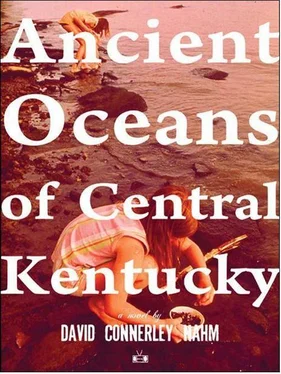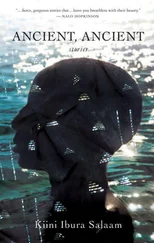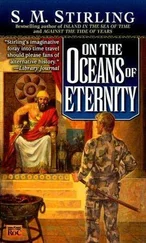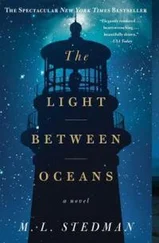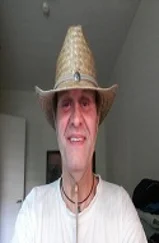Cherry and cinnamon exhalations and the coming evening quilted quiet stars over the courthouse as the custody hearing went longer than expected.
Children swam, gradually threading out into murky water to murky depths. Mothers in tank-tops leaned against cushions, sunglasses dull. Books with broken spines and books with swollen pages. Yellow edges and black blooms and a warm smell. Dead-leaf grot on lofts of lake water. Blue between branches dimmed. The mothers dozed and across the lake a filthy-looking woman walked through the trees, looking down at the children between the trunks, far from the bare arms of the sunlight. Without fear, the children dared one another to swim out across the water’s skin, out to the drain pipe that runs under the road, to swim through. On the other side, a stream, smooth rocks, water lapping air, muddy bank slipping green into clear water. They extended arms beyond the prickly blue rope, the freedom of the whole lake just beyond. One was missing, so they called and listened for his response. They sounded games, eyes closed, arms aflail, searching for the missing body, screaming and grabbing but not finding. They called and called, listening for that voice in response, that splash, imagining, eyes closed, diving down to the bottom of the man-made lake, the sunken plain, the abandoned homes still standing empty below them. They found him and it was someone else’s turn to go missing. Across the water, where the branches overhang, dead leaves lapped at spinning green water.
“Honey, don’t worry so much. Your brother isn’t going to run away. Your father won’t let anything happen. He is just throwing a fit because he doesn’t like to wear a tie. Ignore him and he’ll stop. Please.”
The neighborhood boys who liked to push little children down. The boys who curse and call names. The boys who ask what sex is and laugh when you blush. The girls who call names and squirt white glue into your hair on lice-check day. The girls who bite and roll their eyes. The boys and girls screaming and swirling around the playground. The girls and boys pushing and pulling and pinching and touching and smelling of dried drool.
Perched on the top of the jungle gym, she watched Jacob sitting alone near the other children his grade on rotting railroad ties. Her classmates whispered to her about this one boy who—
And they giggled. The bell trilled. The children flocked in.
And at night she sat on the edge of Jacob’s bed, crawling over in the dark after he pestered her for several minutes for a story and she told him about the boy who was bad and got lost in the woods and heard something following him on the path, something large, something growling and breathing, something that smelled like the wet leaves underneath of the dry leaves. Something that smelled like blood and they both got a little scared at that even though neither knew what blood smelled like. Perhaps the wind blows through the branches of the maples like a breeze through nails. The boy met the Devil, whose real name is Christopher Lark. Leah described his bloody teeth and yellow eyes and the terrible awful breath that smelled like mushrooms. When she noticed that Jacob was terrified, she stopped the story and told him that she was just making stuff up and kissed him on the forehead but she could feel him shivering. She looked at Jacob in the dark and the bright shadows passed and they lost count of the shapes and sounds. If the car passed to the right, Jacob got a point and if it passed to the left, Leah did. Jacob asked who was winning and she didn’t know because she lost count when he got ahead. He asked how many stars there were and she didn’t know that either.
All children want to go to space. Earth only offers parents wailing about overdraft notices and evening news playing in an empty den. Dead pets too. Childhood is a rot. And so they look up and see stars shiver, ancient information only just now arriving, because that is the only place left to look, and they yearn. The Earth crumbles back into itself but there, spinning space stations, eternal bulbs of light, children, unaware of their parents calling them from the screened-in porch, lie on their backs on hillsides, razor blades of grass pricking them through their shirts, their eyes on the black mesh above them, the white pin pricks in the fabric, like a lovely city seen from above.
The young child jabbered and wailed along the crumbling brick walk. The tongues of paper, the limbs in last light, the dark halls of the empty church unexplored. In the department store, Leah waited by the bank of windows for her turn to pay as the growing mass, shivering and thrumming, cackled into palms or stared down into pixilated stigmata. Women in coats, puffy with down, colors faded, dirty faux-fur trim. Women in faded jeans, in sweatpants, in nice slacks. Women in hoodies and in blouses their mothers gave them. Women in clothes from mothers and aunts and church drives. Women in ill-fitting clothes purchased at Goodwill. Nice suits on strong shoulders. Nice shirts over swell of breast and swell of stomach and swell of hips. Over thin arms and thin shoulders. Bare shoulders. Rasping, singing, calling, drawling. The smell of shampoo and hair and bodies and breath and perfume and deodorant and cigarettes and cough cough cough. The children sit and stare or ramble. The cell phones toll tones, squawk messages, titter and trill. One moment, a glance, one second, thumbs trembling, a sigh, a laugh, do you mind, one moment, a grunt, a moan, and “See, see? This is what I mean.”
And out the window, across the parking lot, along the road, in the glitter of glints of sunlight off of passing cars, that filthy woman was walking, her long brown hair hanging in greasy vines, and despite the distance, Leah felt certain that she could clearly see the woman’s face, the thick black liner around eyes that were fixed straight ahead as she walked. Her cheeks rouged and a glimmer of something like earrings seen momentarily in the gaps of her swaying hair. And then she passed beyond the edge of the window and Leah, next in line, had to turn to the dark of the cash register and complete her transaction.
In her apartment, she wondered what it would be like to wander in the woods by the stream alone, in the dark, but went to sleep instead.
“At night he turns into a snake and comes and taps on my window.” The children gather around Leah when she visited the shelter, begging for her to play. One boy whispered in her ear and Leah looked at him confused. One girl asked Leah if she was white and Leah felt embarrassed to answer. The boy told the little girl, as they sat next to Leah, that he could “see him outside at night.”
Listen : The rooms are cool. Moss reminds her of home. A gale of smoke. They pushed up the nails and her heart stopped. She carved our place into the banister. Listen : Sun teeming on warm grass. Glassy rays. A dogwood, the bloody crowns, maple and magnolia. At night she would press her hands into her eyes as she lay in her bed and watch the phosphorescent blips recede into the milky black. She knew her name would be gone if she looked. See how high I can climb? The stream eddied and her eyes went slack. Listen : Daylight walls dun colored, carpets crème, halls mint, ceiling eggshell. Tiles sagging from rainwater. Plaster buckling from rainwater. At night all blue-black nothing. Already going gray. Thick wrists and hands. Far from attractive. Watery blood dried quick around the nails. Look at me. Listen : A pawing at the window. Look. Listen : The girl drew a boy with a city behind him, a farmhouse and grapes under ground. A man on a hill clawing the sun. Rays dripping down his arms in gold and silver. Leah! Listen : A rake’s gaze at the lazy girls, drying themselves off. Leeaaah! Listen : A cracked blue egg. The edges of the field, lined with tobacco or corn or dead rot disappear over the full-bellied knoll. Or warehouses blown down. Or houses burned. Or barns falling in from the wheeling of seasons. From an odd spot above, see the little boy running deeper. The stalks sulking, the Easter best, a last swish of sun-bleached hair and then he slips below the surface like a coin into a fountain, his shadow more than enough to set off a commotion of brightly shaped flashes in the front of his sister’s eyes. His mother calls and calls from a porch, painted Passover pink. Leah never remembered these evenings, even as they took more and more of her time, though she often had thoughts of large white machines, smooth, flowing lines of lights.
Читать дальше
